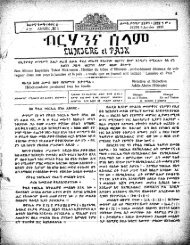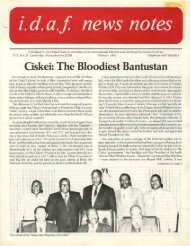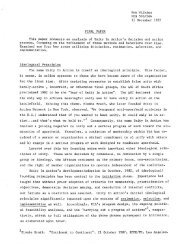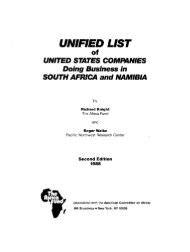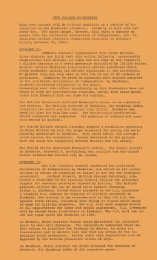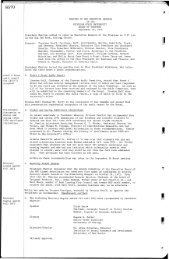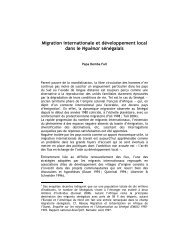the churches and southern africa - KORA
the churches and southern africa - KORA
the churches and southern africa - KORA
Create successful ePaper yourself
Turn your PDF publications into a flip-book with our unique Google optimized e-Paper software.
The article suggests that <strong>the</strong> real issue is whe<strong>the</strong>r Gulf<br />
benefits <strong>the</strong> people of Angola. Not surprisingly, it<br />
concludes, "We believe we definitely do." They cite <strong>the</strong><br />
cascading effect of Gulf's 700 jobs, which <strong>the</strong>y believe<br />
create as many as 7,000 o<strong>the</strong>rs. They quote figures<br />
showing skyrocketing school enrollments <strong>and</strong> phenomenal<br />
increases in government expenditure on health, education,<br />
<strong>and</strong> agricultural development. Gulf concludes its five-page<br />
defense with largely irrelevant charts on <strong>the</strong> concession<br />
agreement, employment (which is not significant), <strong>and</strong><br />
company contributions, ' claiming that "equally<br />
concerned" church leaders support Gulf's payments to<br />
<strong>the</strong> Portuguese.<br />
The Orange Disc does not refer to <strong>the</strong> relationship<br />
between Angola <strong>and</strong> Portugal, nor give any indication of<br />
<strong>the</strong> economic misery of <strong>the</strong> indigenous population. A<br />
reading of Gulf's article leaves an impression that Angola<br />
is among Africa's -most peaceful <strong>and</strong> prosperous<br />
nations-not one rof <strong>the</strong> last vestiges of European<br />
colonialism where a brutal war for <strong>the</strong> territory's future<br />
has been waged for <strong>the</strong> last 11 years.<br />
O<strong>the</strong>r Companies<br />
After winning <strong>the</strong>ir proxy battles, NEWMONT <strong>and</strong><br />
AMAX (American Metals Climax) became silent on <strong>the</strong><br />
Sou<strong>the</strong>rn Africa issue, as did UNION CARBIDE <strong>and</strong><br />
FOOTE MINERAL COMPANY, <strong>the</strong> illegal importers of<br />
chrome from Rhodesia. Finally, GENERAL ELECTRIC,<br />
which avoided a proxy battle with <strong>the</strong> Presbyterians<br />
through a technicality, receqtly issued its "two cents" on<br />
<strong>the</strong> subject via a few sentences in its own publication to<br />
shareholders, <strong>the</strong> G.E. Investor (Summer 1972). In it,<br />
G.E. claims to have an "affirmative action program" (note<br />
<strong>the</strong> American ring) to "ensure continuing progress for<br />
nonwhite employees in South Africa."<br />
In sum, <strong>the</strong> companies responded to church pressures<br />
with <strong>the</strong>ir own best interests at heart. The revelations<br />
ere not surprising, but <strong>the</strong>ir existence throws <strong>the</strong> ball<br />
back in <strong>the</strong> <strong>churches</strong>' court.<br />
BALTIMORE DOC K WORKERS CONTINUE PROTEST<br />
AGAINST RHODESIAN IMPORTS<br />
Members of <strong>the</strong> Baltimore International LongShoremen<br />
Association, consistent with <strong>the</strong> position of <strong>the</strong>ir fellow<br />
workers in Louisiana, have refused to offload materials<br />
from Rhodesia. In mid-March <strong>and</strong> April, <strong>the</strong> first<br />
shipments of Rhodesian chrome ore arrived in Louisiana<br />
<strong>and</strong> union dockworkers refused to unload <strong>the</strong>m. (See<br />
SOUTHERN AFRICA, Vol. 5, No. 5, May, 1972) These<br />
imports, although in violation of <strong>the</strong> U.N. sanctions, were<br />
allowed by <strong>the</strong> passage of <strong>the</strong> Byrd Amendment last year.<br />
(See U.S. AND SOUTHERN AFRICA, this issue) Since<br />
<strong>the</strong> spring at least eight more shipments of strategic<br />
materials have arrived, including cargoes of nickel<br />
cathodes <strong>and</strong> ferrochromium. This increase in imports,<br />
which involves cooperation between <strong>the</strong> U.S.<br />
Government, <strong>the</strong> importing company (i.e. Union Carbide,<br />
Foote Mineral, Kaiser Aluminum, Phillips Bro<strong>the</strong>rs [a<br />
subsidiary of Engelhard Corporation] ), <strong>and</strong> <strong>the</strong> shippers<br />
(Farrell <strong>and</strong> Moore-McCormack), indicates <strong>the</strong> extent to<br />
which <strong>the</strong> U.S. is willing to give <strong>the</strong> illegal Smith regime<br />
more than a helping h<strong>and</strong>. This generous assistance is<br />
evidenced by <strong>the</strong> fact that even <strong>the</strong> imported minerals<br />
(chrome <strong>and</strong> nickel) have recently been declared<br />
superfluous to our stockpile of strategic materials; in July<br />
<strong>the</strong> Congress voted to se II surplus nickel to <strong>the</strong><br />
U.S. Mint. (Congressional Record, House, July 17, 1972,<br />
H6531)<br />
The tenacity of <strong>the</strong> staff at <strong>the</strong> American Committee<br />
on Africa, <strong>the</strong> cooperative action of <strong>the</strong> ILA (in New<br />
York, Louisiana, <strong>and</strong> Baltimore), <strong>and</strong> <strong>the</strong> militancy of'<strong>the</strong><br />
Black community against U.S. aid to racism in Sou<strong>the</strong>rn<br />
Africa, have continued to highlight ahd expose <strong>the</strong> U.S.<br />
practice of importing directly from Rhodesia.<br />
Most recently, on August 1, <strong>the</strong> Moore-McCormack<br />
ship "Mormaccove" was prevented from offloading 62<br />
drums (12 t ais) of nickel cathodes in Baltimore; one of<br />
<strong>the</strong> major entry ports for African goods. Sixty members<br />
of <strong>the</strong> Baltimore African Liberation Support Committee,<br />
SOBU, Congressional Black Caucus, <strong>and</strong> American<br />
Committee on Africa, picketed <strong>the</strong> ship, <strong>and</strong> <strong>the</strong><br />
dockworkers action forced <strong>the</strong> importers (Phillips<br />
Bro<strong>the</strong>rs) <strong>and</strong> <strong>the</strong> shippers, at some expense, to<br />
surreptitiously divert <strong>the</strong> Rhodesian nickel to<br />
Philadelphia. There was some dispute, because <strong>the</strong><br />
shippers <strong>and</strong> an "industry source" contended that <strong>the</strong><br />
nickel cathodes were not from Rhodesia, but probably<br />
from South Africa (since Rhpdesia is l<strong>and</strong>locked, <strong>the</strong> only<br />
information available is that of <strong>the</strong> port of origin). But<br />
since it is known that in previous months<br />
Moore-McCormack ships from Durban, <strong>the</strong> origin of this<br />
August 1 shipment, have carried Rhodesian nickel<br />
cathodes (not South African nickel), it was likely this<br />
cargo was from Rhodesia as well. The Baltimore workers<br />
action was accompanied b y <strong>the</strong> presence of two Black<br />
Caucus members of Corgress, local Congressman Parren<br />
Mitchell, <strong>and</strong> Chairman of <strong>the</strong> Africa Sub-Committee of<br />
<strong>the</strong> House Foreign Affairs Committee Charles Diggs. Diggs<br />
spoke at a Baltimore press conference, declaring: "No<br />
amount of slick Rhode sian Information Service or State<br />
Department 'PR' can disguise <strong>the</strong> existence of<br />
involuntary servitude in Rhodesia. . . . But<br />
slavery... inevitably creates <strong>the</strong> conditions that allow <strong>the</strong><br />
slave to throw down <strong>the</strong> slave owner. That act begins<br />
when <strong>the</strong> oppressed man says 'NO.' "<br />
In his speech Diggs hailed <strong>the</strong> 'NO's' of <strong>the</strong> strikers in<br />
Namibia, of <strong>the</strong> people in Zimbabwe, <strong>and</strong> <strong>the</strong> resounding<br />
NO of <strong>the</strong> dockworkers in Baltimore. He warned: "Let<br />
<strong>the</strong> American shippers <strong>and</strong> Rhodesian slavers know that if<br />
<strong>the</strong>y send <strong>the</strong>ir tainted cargos to American ports, <strong>the</strong>y<br />
will sit in <strong>the</strong> ship." He called on <strong>the</strong> AFL/CIO to<br />
publicly announce opposition to <strong>the</strong> entry of Rhodesian<br />
goods to <strong>the</strong> U.S.<br />
During <strong>the</strong> debates on <strong>the</strong> Byrd Amendment, labor was<br />
one of <strong>the</strong> few strong voices in opposition, including <strong>the</strong><br />
United Steelworkers of America <strong>and</strong> <strong>the</strong> ILA. The United<br />
Nations has continued to condemn U.S. policy, as has <strong>the</strong><br />
OAU . On July 28 <strong>the</strong> Security Council again called for<br />
an end to Rhodesian imports; <strong>the</strong> U.S. abstained on <strong>the</strong><br />
vote. The U.S. Government has been submitting<br />
information to <strong>the</strong> Special Committee of <strong>the</strong> Security<br />
Council which deals with Rhodesian sanctions, although<br />
<strong>the</strong> information about <strong>the</strong> nature of <strong>the</strong> imports, port of<br />
entry, etc., is always given post facto. Therefore <strong>the</strong><br />
necessity of widening. <strong>the</strong> opposition to U.S. policy<br />
through such investigative work as done by ACOA. If you<br />
are interested in involving yourself or your union in <strong>the</strong>se<br />
actions, contact Henry Lieberg, American Committee on<br />
Africa, 164 Madison Ave., New York, N.Y. 10016. (The<br />
Sun, Baltimore, July 26, 1972; August 1 <strong>and</strong> August 2,<br />
1972; The Washington Post, August 2, 1972; The Sunday<br />
Star <strong>and</strong> Daily News, July 30, 1972; U.N. Press Release,<br />
SC/3344, August 4,'1972; Star, Johannesburg, August 5,<br />
1972.)



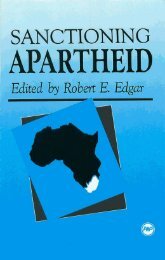
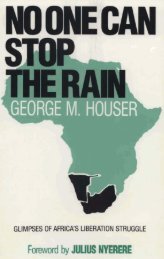

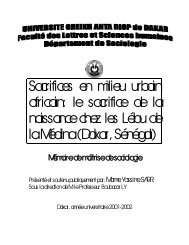
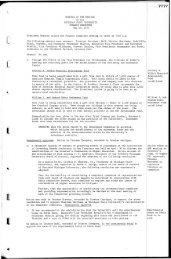
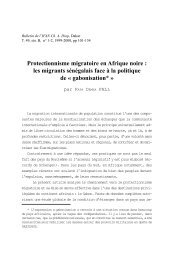
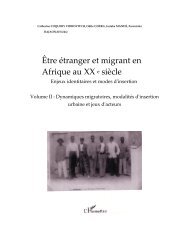
![Synthèse [6] DEFALL..INSTRAW.pdf - Matrix](https://img.yumpu.com/17880734/1/190x245/synthese-6-defallinstrawpdf-matrix.jpg?quality=85)
